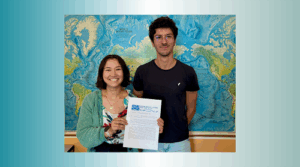Séminaire
Towards the combination of physical and data-driven forecasts for Earth system prediction
Eviatar Bach
Séminaire co-organisé par l’IPSL et AI for Climate (AI4C)
Description
Due to the recent success of machine learning (ML) in many prediction problems, there is a high degree of interest in applying ML to Earth system prediction. However, because of the high dimensionality of the system, it is critical to use hybrid methods which combine data-driven models, physical models, and observations. I will present two such hybrid methods: Ensemble Oscillation Correction (EnOC) and multi-model data assimilation (MM-DA).
Oscillatory modes of the climate system are one of its most predictable features, especially at intraseasonal timescales. It has previously been shown that these oscillations can be predicted well with statistical methods, often with better skill than dynamical models. However, they only represent a portion of the signal, and a method for beneficially combining them with dynamical forecasts of the full system has not previously been developed. Ensemble Oscillation Correction (EnOC) is a method which corrects oscillatory modes in ensemble forecasts from dynamical models. We show results of EnOC applied to chaotic toy models with significant oscillatory components, as well as to forecasts of South Asian monsoon rainfall.
A more general method for combining multiple models and observations is multi-model data assimilation (MM-DA). MM-DA generalizes the variational or Bayesian formulation of the Kalman filter. However, previous implementations of this approach have not estimated the model error, and have therewith not been able to correctly weight the separate models and the observations. Here, we show how multiple models can be combined for both forecasting and DA by using an ensemble Kalman filter with adaptive model error estimation. This methodology is applied to multiscale chaotic models and results in significant error reductions compared to the best model and to an unweighted multi-model ensemble. Lastly, I will discuss the potential of this method for combining physical model forecasts, ML, and observations.
Informations supplémentaires
Eviatar Bach is a Make Our Planet Great Again (MOPGA) postdoctoral fellow in Michael Ghil’s group at the École Normale Supérieure in Paris. Previously, he obtained his PhD at the University of Maryland, College Park with Eugenia Kalnay and Safa Mote. He is currently working on improving geophysical forecasts with data assimilation and data-driven prediction methods, and is interested in understanding the nonlinear dynamics and predictability of the climate system.
Retransmission en ligne : https://us02web.zoom.us/j/84372436675?pwd=eWhwR2NXYllKUUpWOGU3OGEvUVR3Zz09






